The post Discover deeper campaign and visitor behavior insights with the new Matomo Integration appeared first on VWO Product Updates.
]]>What is Matomo?
Matomo (formerly Piwik) is an open-source web analytics application to track online visits to one or more websites and display reports on these visits for analysis. Overall, Matomo provides a web analytics solution that places a strong emphasis on data ownership, privacy, and customization.
Here are a few use cases of how Matomo Integration can be useful to you:
1) A/B Testing Analysis via Goals
By integrating VWO with Matomo, you can analyze the results of your A/B tests in the context of your overall website analytics for different Metrics/Goals. This integration enables you to see how different variations of a page are performing not only in terms of conversions but also in terms of other important metrics (referred to as ‘Goals’ in Matomo) like Page Visit, bounce rate, time on page, and user engagement. This comprehensive analysis helps you make data-driven decisions about which variations are truly improving user experience and driving desired outcomes.
2) Funnel Optimization
When you run CRO campaigns using VWO, you can use Matomo to track the entire user journey, from entry to conversion via Funnels. This integration enables you to identify user behavior patterns leading to conversions and areas where users might drop off. By understanding the broader context of your CRO experiments within your website’s analytics, you can refine your strategies to optimize conversion funnels effectively.
3) Segmentation and Personalization
Matomo allows you to create custom segments based on user characteristics and behavior. By integrating VWO data, you can analyze how different segments respond to your variations. For example, you can segregate and analyze users based on their device type, location, Operating system, etc. You can assess whether a new design resonates differently with first-time visitors compared to returning users. This insight can inform your personalization efforts, tailoring content and experiences for specific user groups.
Integrating Matomo with VWO
The video below shows how you can integrate your Matomo account with VWO seamlessly in just a few simple steps.
Excited and want to know more?
Our new Matomo integration is available for all plans of VWO Testing, VWO Personalize, and VWO Rollouts. Please check out our knowledge base article to learn more and set it up in your VWO account. For any questions or concerns, feel free to reach out to [email protected].
The post Discover deeper campaign and visitor behavior insights with the new Matomo Integration appeared first on VWO Product Updates.
]]>The post Improved Text Recommendations in VWO: Sharper, more relevant suggestions for your website copy! appeared first on VWO Product Updates.
]]>From its debut in 2020, VWO’s text recommendation feature has been the silent partner to many website conversion optimizers, offering AI-generated alternatives for every text-based element on your site. Today, we’re taking that partnership to new heights, ensuring that your messaging is not just good but exceptional.
Why you’ll love this upgrade:
- Refined suggestions: Dive into a richer pool of recommendations, each optimized to suit your content needs better.
- Tailored to your brand: Beyond just different, get variations that amplify your brand’s voice and positioning.
Want a sneak peek? Check these out:
Example 1:
Older version of Text Recommendation –
New and upgraded version of Text Recommendation –
Example 2:
Older version of Text Recommendation –
New and upgraded version of Text Recommendation –
Notice the refinement? With our enhanced model, you’ll spend less time sifting and more time crafting. The suggestions are finely tuned, streamlining your content adjustments with ease.
What’s behind the enhancement?
For those who like to know the tech behind the magic: we’ve iterated on our text recommendation system, harnessing the capabilities of the GPT-3.5 Turbo model. We also refined the prompts, ensuring contextual and more resonant variations.
Ready to Explore?
This enhanced text recommendation feature is now available across all plans of VWO Testing – Web, VWO Personalize, and VWO Deploy. The possibilities are boundless, and your content is poised to reach new heights.
Need assistance or have questions? Reach out to our dedicated support team at [email protected].
The post Improved Text Recommendations in VWO: Sharper, more relevant suggestions for your website copy! appeared first on VWO Product Updates.
]]>The post Introducing a redesigned experience for creating your Testing campaigns appeared first on VWO Product Updates.
]]>Here’s why we changed things up:
Firstly, we listened to you, our valued customers. We learned that the one-size-fits-all, step-by-step campaign creation didn’t suit everyone. Some of you wanted to jump straight to metrics, while others wanted to kick off with variations. The need for greater flexibility became abundantly clear, prompting us to reimagine the campaign creation flow.
Secondly, as VWO has expanded its offerings, we’ve packed in a myriad of powerful features. However, these features weren’t always easy to find. Our user experience analysis revealed a need for a more intuitive interface to enhance feature discoverability.
Finally, as an industry leader in optimization, we believe in setting the bar high. This update aligns us with modern, industry-standard designs to offer you an even better user experience.
The new design centers on three core pillars:
- Ease of campaign creation
- Collaboration in campaign creation
- Discoverability of features
What’s changed, and how does it benefit you?
1. Flexible campaign creation: Now, you can start configuring the campaign with any element of your campaign, be it a metric, variation, or target audience. Collaborate as a team on different parts of an experiment simultaneously, work with agility to create tests, and, in turn, speed up test setup with our new interface.
2. Streamlined execution: Launch your campaigns faster with only three mandatory steps. Choose the campaign page, select your metrics, and create variations in any order that suits you. This new approach ensures a quicker and more efficient setup, improving your experimentation & optimizing velocity.
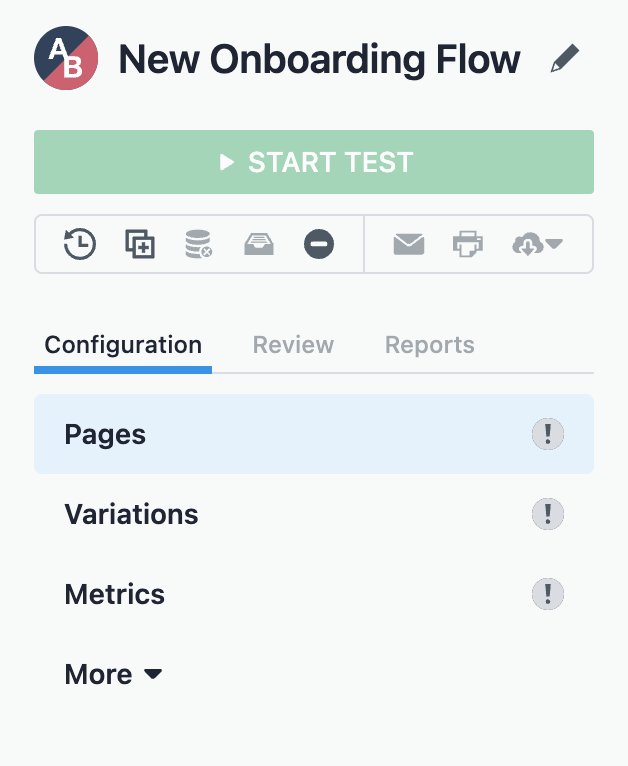
3. Comprehensive pre-launch review: Never worry about manual errors slipping through and affecting your testing program. Review your entire test campaign with a live preview and detailed screenshots of the variations. This thorough overview ensures accuracy and alignment with your campaign objective, so you confidently launch it.
4. Seamless post-launch management: Navigate effortlessly to your campaign report once your campaign is live. Plus, all additional configurations like audience selection, triggers, integrations, scheduling, and privacy options are neatly organized under “More configurations.”
5. Enhanced feature discovery: We’ve made essential features like the activity timeline, campaign cloning, report sharing, et al., more prominent and accessible.
Ready to explore?
The revamped campaign creation flow is now available in VWO Testing – Web. Dive into this fresh experience right away, and remember, you can always switch back if you prefer the previous version.
Need a hand or have a question? Reach out to [email protected]. Our friendly support team is here to help.
The post Introducing a redesigned experience for creating your Testing campaigns appeared first on VWO Product Updates.
]]>The post Introducing VWO’s AI in Surveys to understand customers’ voice faster appeared first on VWO Product Updates.
]]>With the new Generative AI update to our existing survey capability, we are taking it up a notch. This update will assist you in crafting surveys quickly, interpreting their results promptly, and obtaining more insights aligned with your survey goals.
Our latest update offers two game-changing features:
- AI-powered survey creation
- AI-generated survey reports
AI-powered survey creation
Craft perfect surveys with AI assistance
Do you struggle to determine which questions you should include in your survey? VWO’s AI can help!
All you have to do is specify your survey goals, such as gaining insight into customer pain points or receiving product feedback, and the AI will handle the survey creation for you. You can choose from a list of predetermined goals (e.g., support experience evaluation, understand user preferences) or create your own. Then, the AI assistant will generate questions relevant to your specific needs.
For example, if you’re interested in discovering the features your customers want or need improvements on, simply select the “Collect Feature Requests” goal. The AI will create questions to help you discover customer preferences and identify improvement areas.

Regenerate until you are satisfied
VWO’s AI for surveys has been extensively trained to provide you with the best possible questions. However, there could be cases when you don’t like the questions. In such cases, regenerate questions until you craft the ideal survey.

Rewrite your existing questions
Take complete control of the questions in your survey. With just one click, you can efficiently rewrite any question with AI without losing the context of your survey goals. This saves the time you spend brainstorming and researching the best survey language.

AI-generated survey reports
Understand your audience’s pulse quickly
The next important step for you is understanding the survey report and getting customer insights from your survey responses so that you can take action on them.
VWO’s AI-enhanced survey reports make this task super simple, and it goes beyond manual review to unlock a deeper understanding of your audience.
Consider an example where you want to understand visitor feedback about your blog’s content. The new reporting features provide insightful survey summaries and actionable suggestions for improvement at the click of a button. Here’s how:

Summary & key insights
Get a comprehensive and concise summary of your survey results. Discover critical takeaways that showcase the most valuable insights, including the feedback comments provided by respondents. All the necessary information is distilled into easy-to-understand points.
Actionable suggestions for improvement
Beyond just presenting data, the AI analyzes the feedback from the survey to suggest specific actions you can take. Whether it’s a tweak in your product or an adjustment in your marketing strategy, these actionable insights provide a clear path to improvement.
Try VWO’s AI-powered surveys today
VWO’s AI-powered features bring new efficiency and insight to your survey creation and reporting process. Try it today and elevate your understanding of your audience. The feature is currently in beta. If you want to try it, please request to enable it by contacting [email protected] or informing your customer success manager. If you don’t have a VWO account, sign up for a free trial here and request the feature.
The post Introducing VWO’s AI in Surveys to understand customers’ voice faster appeared first on VWO Product Updates.
]]>The post Make decisions based on environment-specific data in VWO Testing Server Side campaigns appeared first on VWO Product Updates.
]]>Earlier, with VWO Testing – Server side, you could only segment reports specific to environments under each project for their campaigns. The post-segment feature helps you get granular insights about campaign performance. However, VWO declares experiment winners based on aggregated data from all environments.
With the new update, you can choose the project and default environment that VWO should use for decision-making. The added feature helps run experiments in cases where eliminating overlap of conversion data across environments is essential. The feature helps determine winning variations according to the exact user behavior within the chosen environment.
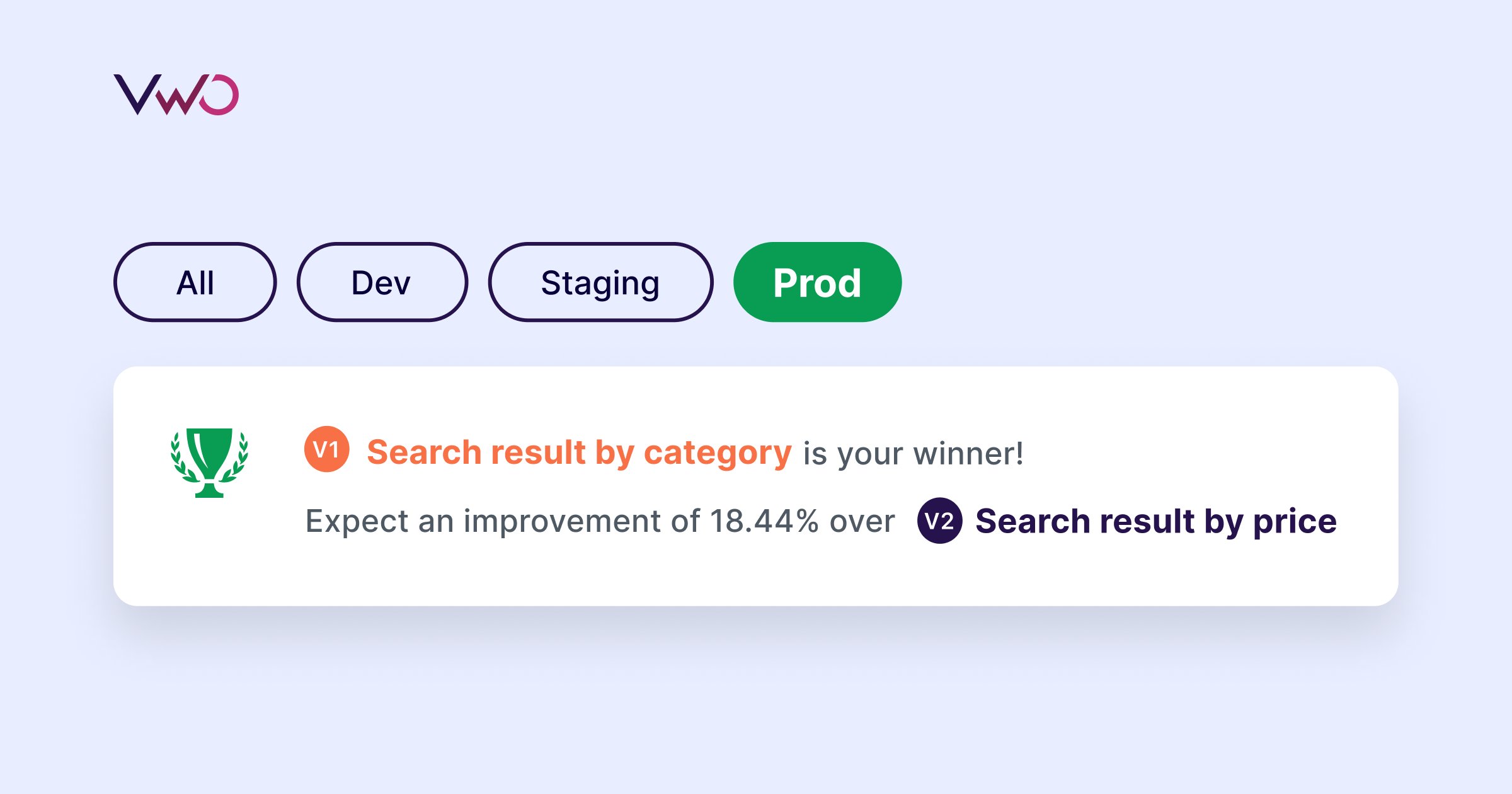
How does this update help you?
The update helps you choose winning variations from environments exactly where you plan to deploy the change.
Imagine you’re a product manager testing a new feature launch. How your employees use the product would differ from how customers use it. While you would like to beta test the features with employees and early adopters, you would still want to know the experiment winner based only on the data from the production environment. Since the cohort of users is different, the winning variation could be different for different environments.
For example, in a retail organization where employees of a certain cadre have a separate purchase portal with concessions and benefits, it is given that the user behavior would be different on the internal portal and the external portal, although the products and interface might be the same. In such cases, if experiments have to be done to test employee benefits, the internal environment can be chosen for winner declaration, whereas for customer-centric experiments, the public environment can be chosen.
Until earlier, you could only segment the report to view conversions for the environments but could not determine if the overall winning variation was the same as the winning variation specific to an environment. With the feature update, you can choose the environment for which you want the winner. VWO will declare a winner based only on the conversion data from this chosen environment and not cumulatively. So you can deploy the analytically determined best variation post your experiments.
The feature enhancement opens up a wide range of experimentation possibilities and helps you pick the best variation specific to testing environments. You also have a bird’s eye view of conversion across other environments.
How can you enable this option?
While setting up a campaign, by default, VWO calculates the winner using conversion data from all environments selected for the project. To use only one environment, you must enable the checkbox that says, “Calculate the winner using data from a specific environment of a project.”
This option can be enabled or disabled only while setting up the campaign and cannot be changed once the campaign has started.
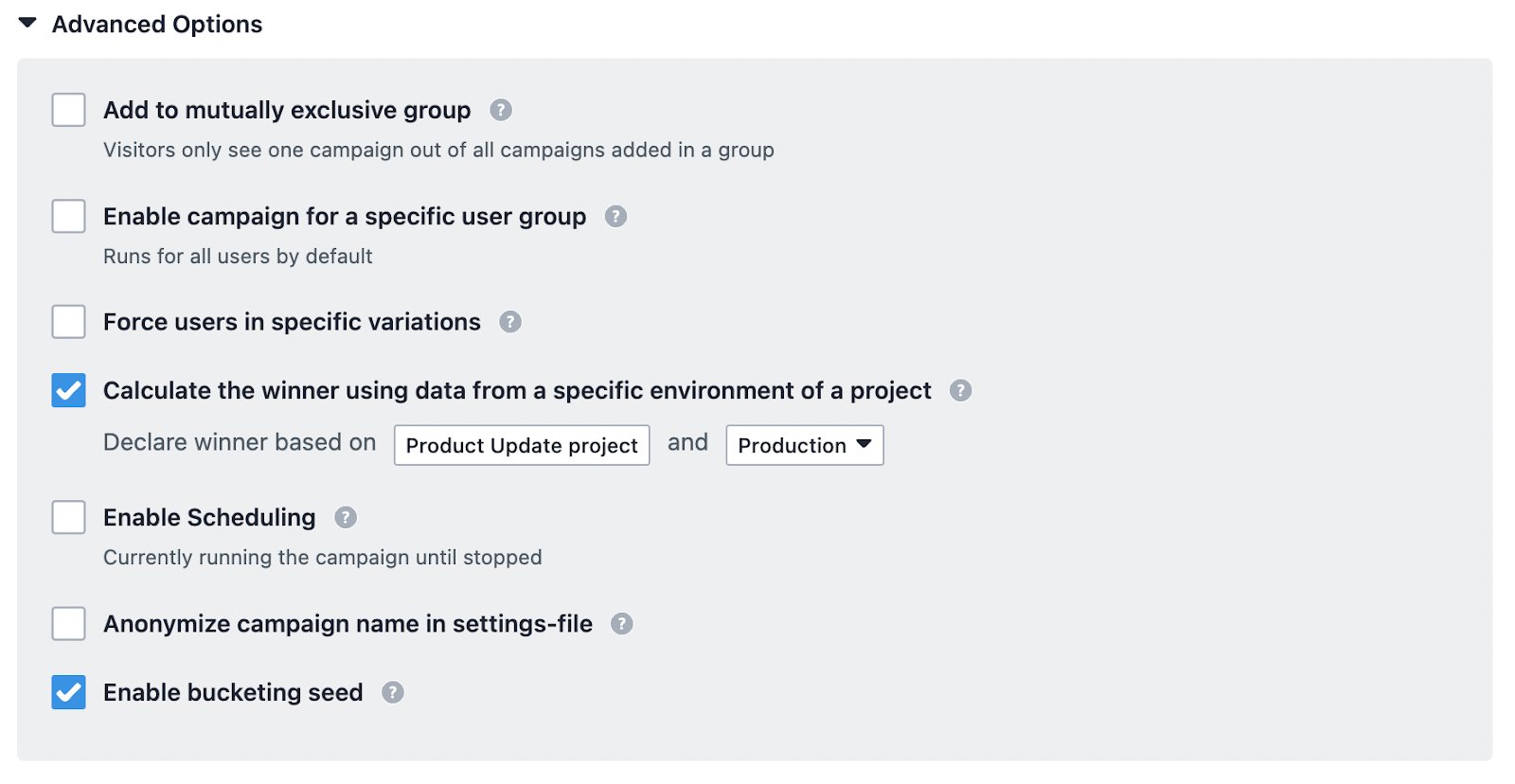
While conversion data and all other components of the reports remain the same, VWO will declare a winner based only on the conversion data of the selected project and environment.
You can segment reports by environments, filter them, and analyze them by exporting them or pushing them to analytics tools such as Google Analytics, Mixpanel, etc.
Excited to try it out?
Winner calculation using data from specific environments is now available on VWO Testing – Server Side. You can get a detailed, step-by-step overview of how to enable this feature from this knowledge base article.
For any questions or concerns, please feel free to contact [email protected].
The post Make decisions based on environment-specific data in VWO Testing Server Side campaigns appeared first on VWO Product Updates.
]]>The post Personalize and optimize experiences using Segment’s Engage Audiences appeared first on VWO Product Updates.
]]>This update builds upon our existing integration with Segment, which allows you to receive events and attributes from Segment and use them to target visitors, track metrics, and filter campaign reports for deeper insights. The previous update also enabled you to send campaign data from VWO to Segment.
Let’s explore how this new enhancement benefits you and delve into some use cases.
#1 Utilize Segment’s Engage Audiences for targeting campaigns
By enabling the native integration, you can seamlessly sync Segment’s Engage Audiences into VWO. You can sync all audiences or manually add them once you’ve configured the setup.
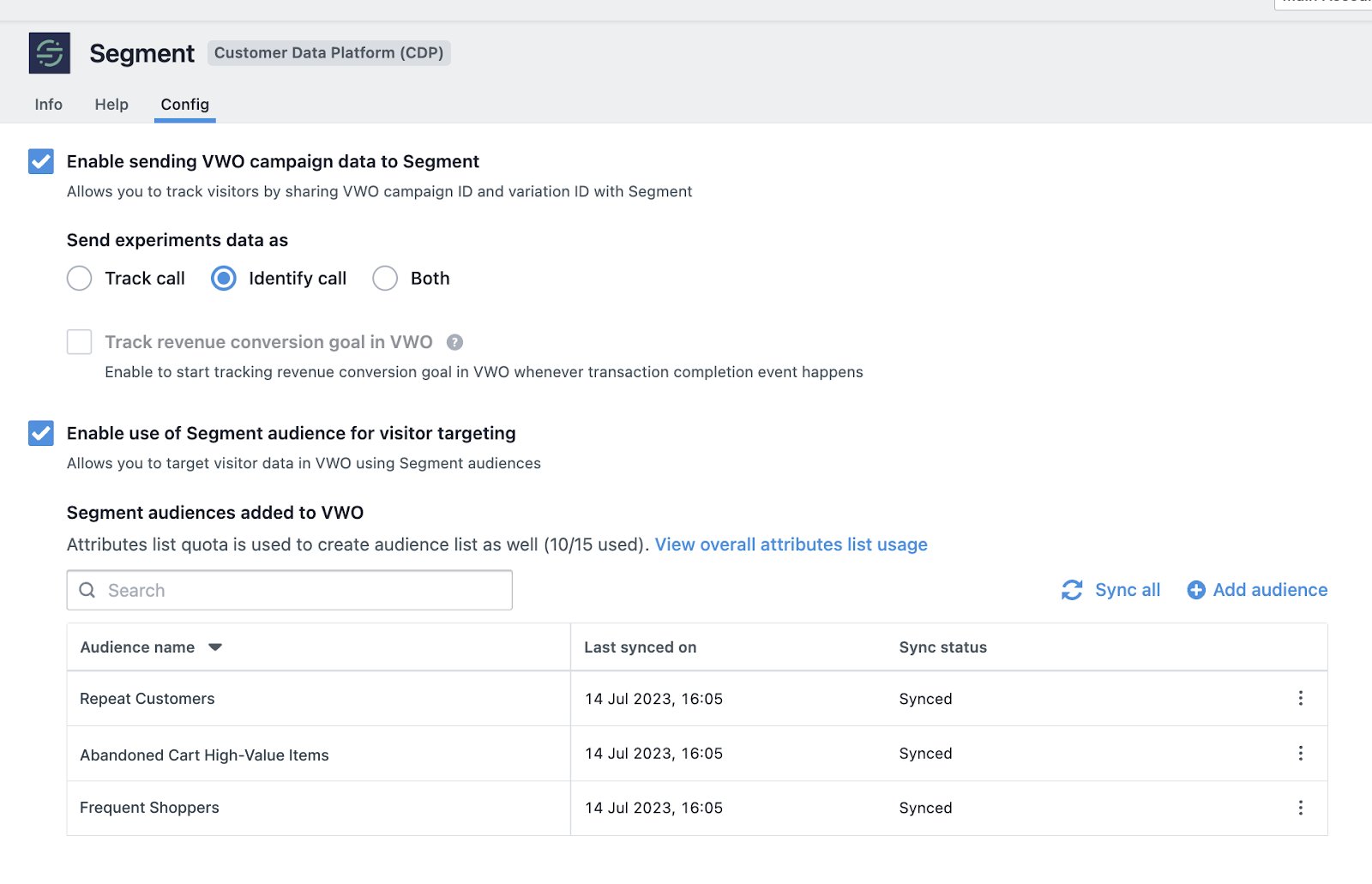
Leveraging these audiences, you can create highly targeted experiences for customer segments specific to your business. This ensures that your optimization efforts are focused and impactful.
Suppose you run an e-commerce company specializing in fashion apparel. You’ve also created audiences in Segment based on their purchase history, visit history, churning traits, engagement levels, customer lists, and behavior-based lists like product preferences and frequency of purchase. Once you’ve synced Segment’s Engage Audiences in VWO, you can create A/B tests, personalized experiences or deploy campaigns for each of these audiences to learn from their behavior, optimize it, and build tailored journeys.
As you create a website optimization campaign using VWO Testing or VWO Personalize, you can access Segment’s Engage Audiences for targeting by selecting the ‘Enable campaign for a specific visitor group’ option under ‘More Options’. Then, simply go to the Custom Segment and create a segment using ‘Segment Audience’. Our integration makes targeting that intuitive.
Here are some more examples of utilizing Segment’s Engage Audiences across different industries for targeting campaigns in VWO.
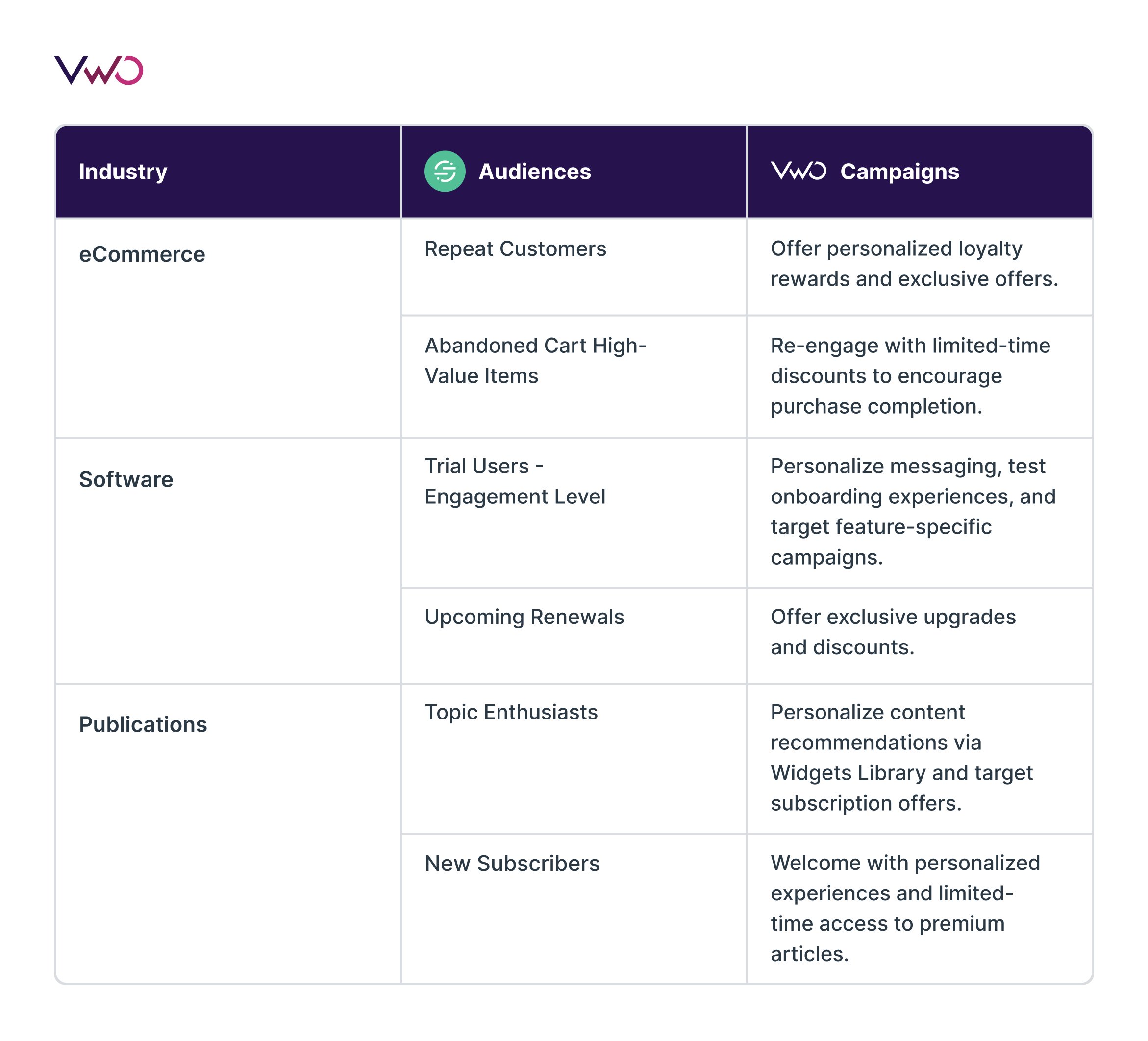
To go through a step-by-step process of how to enable this integration and sync your audience from Segment to VWO, read this knowledge-base article.
#2 Augment Segment’s Engage Audiences with VWO’s extensive targeting capabilities
VWO offers a range of targeting options based on demographics, geolocation, behavior, and device type among others. By leveraging VWO’s targeting conditions in combination with synced audiences, using our bracketing logic and conditional targeting, you can refine your audience segments and deliver hyper-targeted and impactful experiences to a specific subset of your customers.
For example, you can combine an audience of “Frequent Shoppers” from Segment with VWO’s targeting options to specifically target those customers using mobile devices and visiting from a particular region. You can also create advanced custom targeting segments using numerous other visitor attributes and events, and also save them under My Segments for quick reuse.

#3 Combine Segment’s Engage Audience targeting with the power of triggers
Consider you run the optimization program for a SaaS company and have defined various audiences in Segment based on their subscription plan and usage patterns. Now, by combining Segment’s Engage Audiences with VWO’s triggering options, you can deliver highly relevant experiences to different segments at the right moment.
For instance, you have a segment called “Free Trial Leads” for users who are currently exploring your software during their trial period. By syncing this segment in VWO and utilizing VWO’s triggering capabilities, you can engage these users at critical touchpoints.
For example, when a free trial user visits your product or pricing page and spends more than 60 seconds in the session, you can trigger a custom message highlighting the benefits of upgrading to a paid plan. This timely and personalized interaction encourages conversion and drives revenue growth.
Furthermore, you can go as in-depth as you’d like while combining Segment’s Engage Audiences with VWO’s targeting and triggering capabilities. Here’s an extension of the previous example we used in the previous use case.
#4 Observe behavioral analytics for synced audiences in VWO
Leverage synced audiences from Segment in VWO Insights to observe their session recordings, heatmaps, surveys, and funnels. Analyze behavior patterns of specific customer segments, uncover trends, and optimize their experiences accordingly.
For example, you can analyze the behavior, purchase patterns, and engagement levels of your “Frequent Shoppers” on your website by creating a view once you’ve synced them from Segment. Gain valuable insights from the behavioral analytics of a specific audience to enhance their user experience and maximize results.
We are excited to see how you use this enhanced integration to deliver exceptional experiences to your customers.
Excited to know more?
The Segment integration is available in Pro and Enterprise plans of VWO Testing – Web, VWO Insights – Web, VWO Personalize and VWO Deploy. To know more about it and go through a step-by-step guide to enable it in VWO, please refer to the knowledge base article.
For any questions or concerns, please feel free to contact [email protected].
The post Personalize and optimize experiences using Segment’s Engage Audiences appeared first on VWO Product Updates.
]]>The post Prioritize server-side campaigns according to your business needs without any overlap of users appeared first on VWO Product Updates.
]]>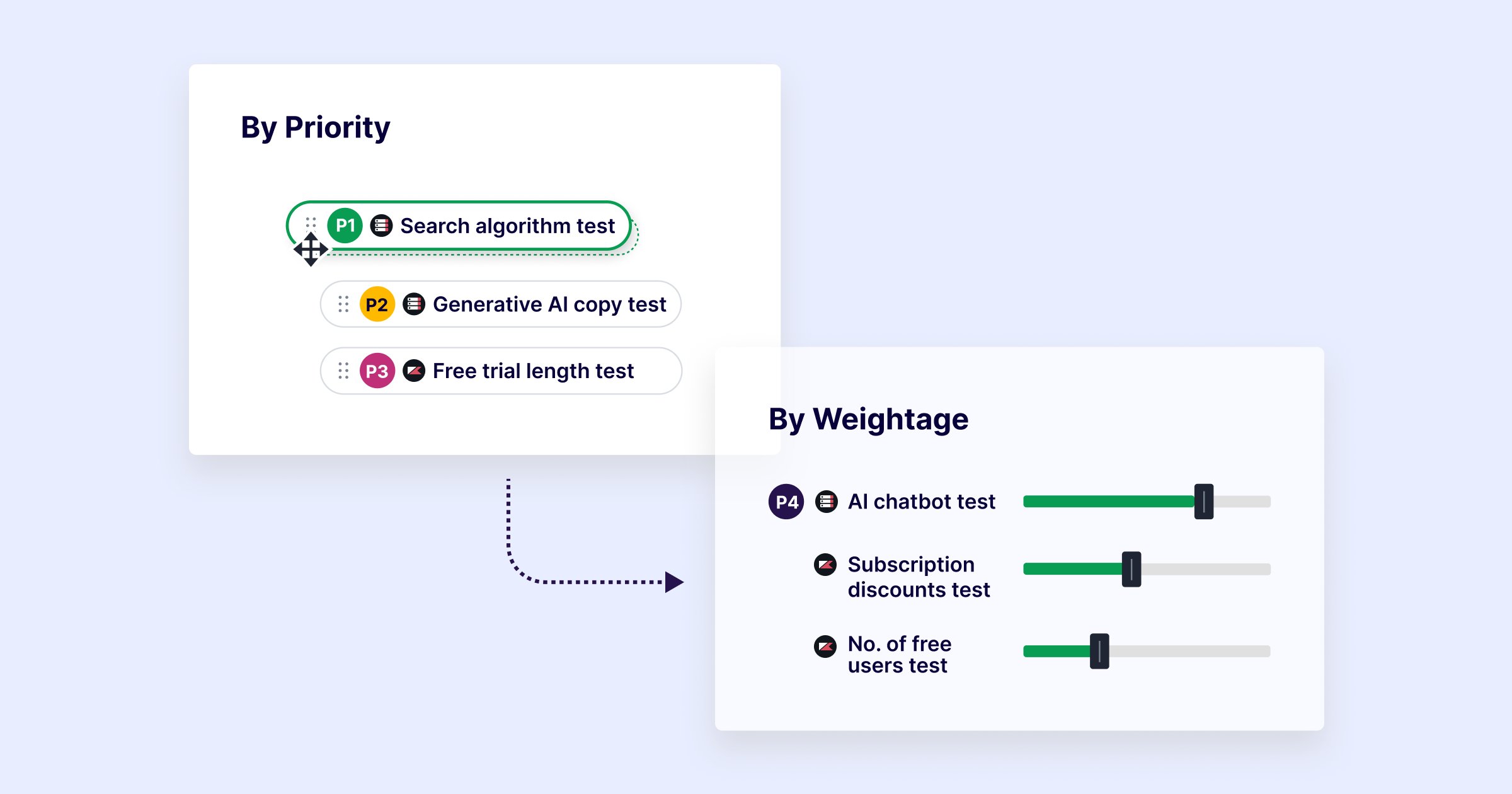
Mutually exclusive groups on server side campaigns – a brief overview
Mutually exclusive campaign groups ensure that a user becomes part of only one server side campaign, even when the user is eligible for multiple campaigns within the mutually exclusive campaign group. VWO serves the corresponding campaign and its variation to the user after factoring in various criteria such as whether the user is whitelisted, whether the user’s campaign is found in the usage storage service, whether the user is already part of any campaign within the mutually exclusive group, user’s eligibility for campaigns within the mutually exclusive group based on targeting conditions, and campaign traffic allocation.
By preventing overlap of eligible users across campaigns running even on the same page with similar targeting conditions, you can maintain clean reports, accurately attribute conversion rate changes to the appropriate campaign, and eliminate bias.
With this new update to our mutually exclusive groups(MEG) functionality, VWO users can choose how users become part of campaigns using the following two methods:
- Random allocation – VWO to distribute users randomly across campaigns.
- Advanced allocation – VWO to distribute users based on campaign priority and weights.
What does the prioritization of campaigns within mutually exclusive groups mean in server side campaigns?
The advanced allocation for mutually exclusive VWO Testing – Server Side campaign can be configured based on priority (P1 – P30, P1 being the highest priority) and weights (1 – 100 as a percentage, where total campaign weights must add up to precisely 100).
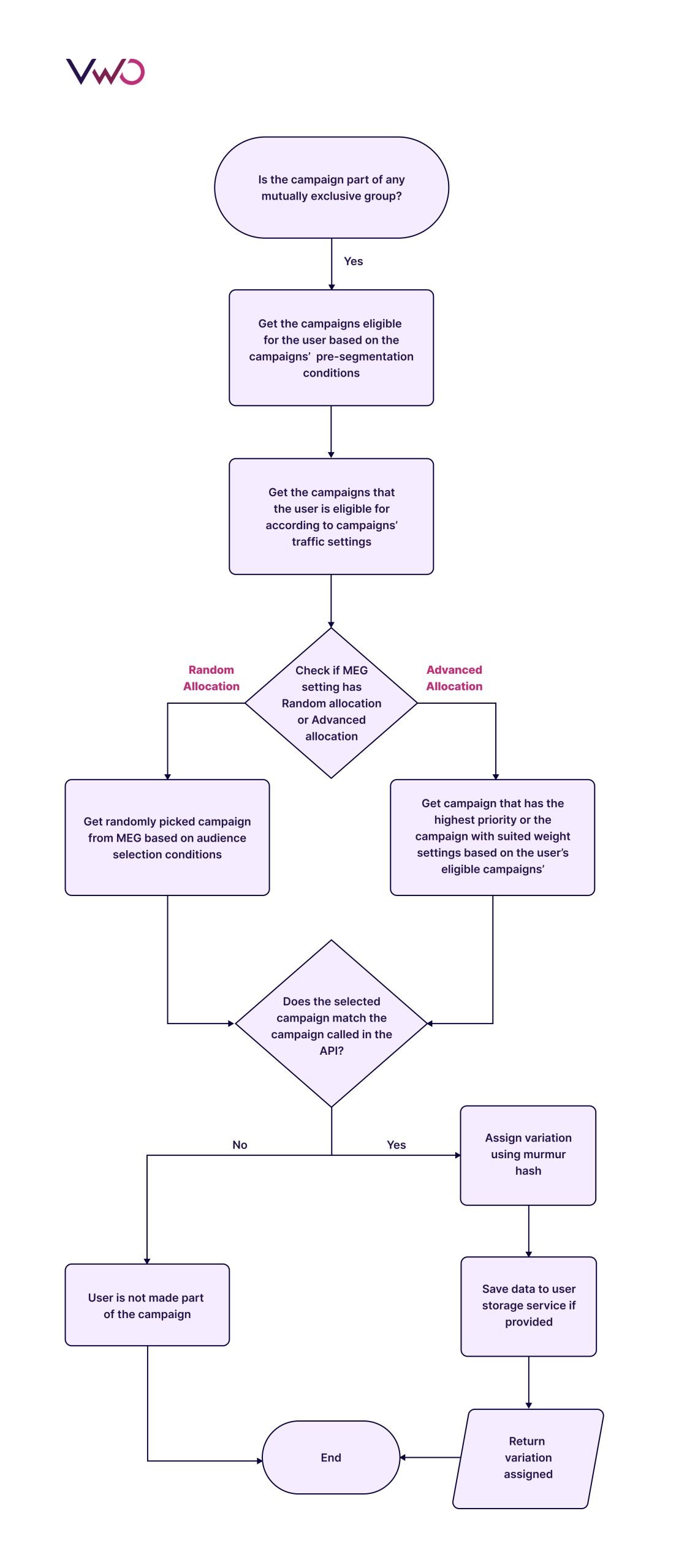
The process of assigning a variation to a user by VWO starts only after the API is called.
VWO selects a campaign from a mutually exclusive group based on the user’s qualification criteria. The campaign’s audience selection rules include criteria such as user behavior, user attributes, traffic rules, and more that are factored in to determine which users are included in the campaign. VWO then compares the selected campaign with the campaign called in the API. If the selected campaign and the called campaign match, the user gets included in the campaign, and VWO serves one of the campaign’s variations. If not, the user does not get included in the campaign. You can read more about how VWO SDKs evaluate mutually exclusive campaigns here.
Like in client-side testing, in server side testing too, you can set priorities and weights within mutually exclusive groups or have only priorities or weights. While the mutually exclusive group can have both priorities and weights, an individual campaign within the mutually exclusive group can have either weight or priority but never both.
How do mutually exclusive groups with priority and weights help VWO customers?
Say you’re the academy manager of a top e-learning company. You would like to test multiple campaigns that increase revenue for the company. For example, you would like to run a test campaign each for annual academy subscriptions, combo course discounts, course changes, and additional test series. Instead of running these campaigns mutually exclusively with random allocation, you can prioritize campaigns in the order of the highest business impact using advanced allocation in VWO Testing – Server Side mutually exclusive group.
Maybe for you, it makes sense to assign the highest priority to the annual subscription campaign, followed by the combo discount campaign, to ensure maximum user allocation (of eligible users) since they’re prone to have the highest business impact. Between the test-series campaign and the e-learning campaign, you can choose to distribute only 30% of your traffic to the test-series campaign since it tests an additional step intended only for outlier users (top students or weak students).
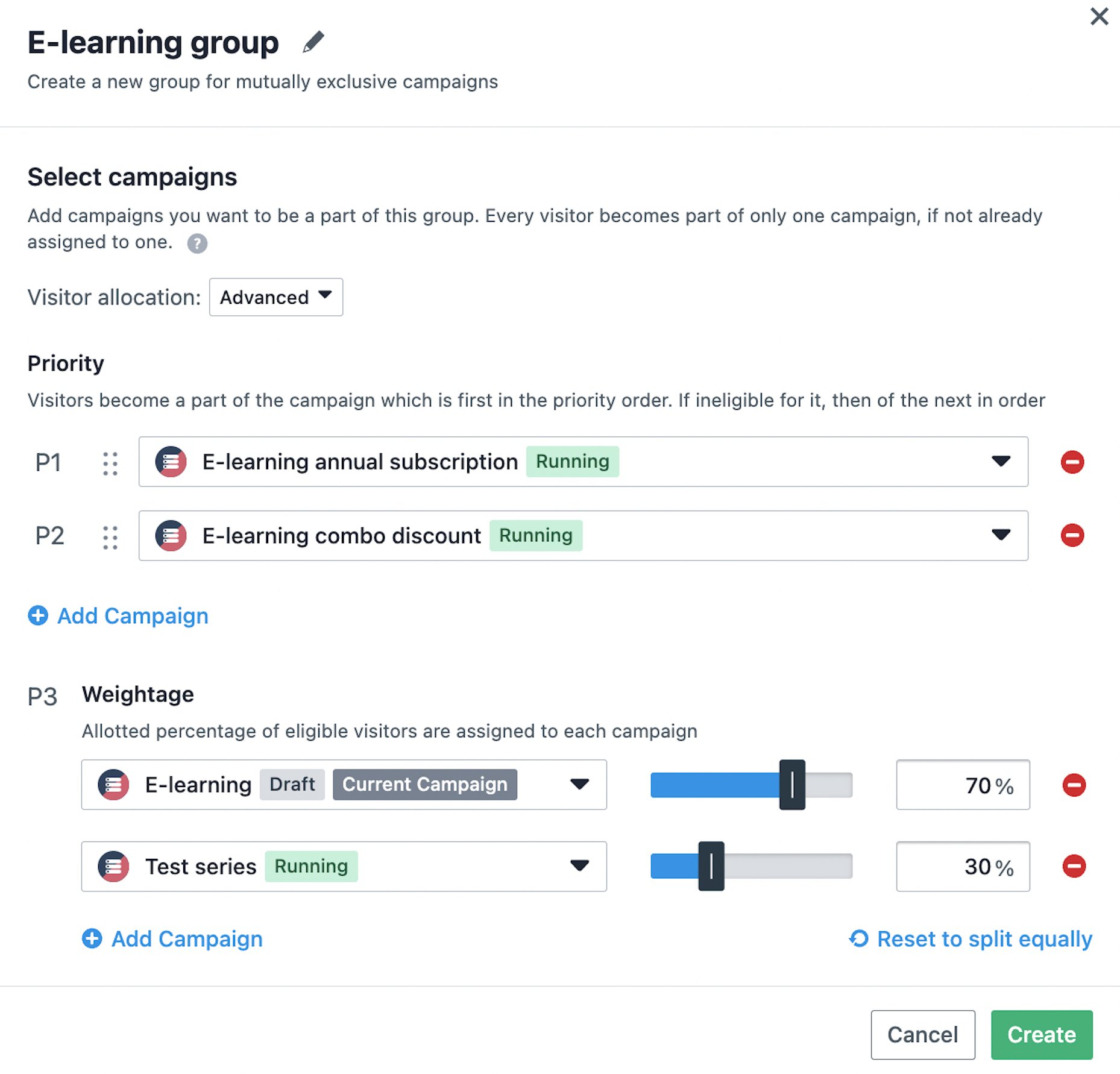
Similarly, you can prioritize your server side campaigns based on your business requirements.
Want to try your hands on mutually exclusive groups with priority and weights?
Mutually exclusive groups with priority and weights are available on the following server side SDKs:
All users of the Enterprise plan of VWO Testing – Server Side, VWO Testing – Web, VWO Personalize, and VWO Deploy can explore mutually exclusive groups with priorities and weights for their optimization use cases.
Please refer to the knowledge base article to learn more about it and follow a step-by-step guide to enable it in VWO.
For any questions or concerns, please feel free to contact [email protected].
The post Prioritize server-side campaigns according to your business needs without any overlap of users appeared first on VWO Product Updates.
]]>The post Enhanced Privacy Control: Proxy VWO SmartCode Requests via Your Own Server for Maximum Data Protection appeared first on VWO Product Updates.
]]>In today’s data-driven landscape, safeguarding sensitive information is paramount. Typically, when a user visits a website integrated with VWO SmartCode, personal data such as IP addresses and browser details are transmitted to the VWO server. Based on this information, the VWO server responds with instructions on which test or variation the visitor should experience, and the corresponding code is executed on their browser. VWO, in general, classifies all information and never stores any personally identifiable information (PII), such as email addresses, passwords, etc. without anonymizing it.
However, if you want to build an additional layer of security and control over your data,
with our latest update, you can now route these requests to your own server before they reach VWO, ensuring the highest level of privacy for your enterprise.
Key advantages of routing requests to your server
1. Exercise full data sovereignty and the highest privacy standards
By directing all VWO SmartCode requests to your server, you exercise complete data sovereignty. This means you maintain exclusive ownership and control over your visitors’ or users’ information. Enjoy the peace of mind that comes from following the highest privacy standards.
2. Mitigate ad blocker disruptions
Ad blocker plugins and extensions have become widely prevalent, often impeding the smooth functioning of most marketing tools, including VWO. By routing requests to your own domain, ad blockers are unable to differentiate the calls between your own website calls or the ones made to proxy data to VWO. Now you can experience uninterrupted optimization and experimentation, without compromising on user privacy or sacrificing valuable insights.
Implementing the reverse proxy feature with VWO
Integrating this feature into your enterprise infrastructure is quite simple and seamless, and it needs some engineering help. Begin by placing the VWO SmartCode within your website’s head tag. Next, replace the default “https://dev.visualwebsiteoptimizer.com” domain with your own server details, employing either a sub-domain-based proxy approach or a path-based proxy approach.
You can choose between these two approaches based on your preferences. The path-based proxy requires no creation of new sub-domains and is easier to configure. On the other hand, the sub-domain-based proxy isolates the proxy from the main service and can be routed to different servers from DNS, providing finer control over traffic distribution.
- For a sub-domain-based proxy approach, replace “https://dev.visualwebsiteoptimizer.com” with any sub-domain of your main domain, such as vwo.mydomain.com.
- For a path-based proxy approach, replace “https://dev.visualwebsiteoptimizer.com/” with your main domain followed by a path, for example, https://mydomain.com/vwo/.
After implementing the SmartCode on your website, configure your server to reverse proxy the requests to “https://dev.visualwebsiteoptimizer.com.” Ensure that you set the host header as your own domain and define a custom header as X-Forwarded-Host, using your own domain. The custom header can also be a path, offering you flexibility in implementation. You can read more about Reverse Proxy Methodology at VWO or contact support.
Now you can elevate your enterprise’s privacy standards and establish a reputation as a responsible custodian of customer data with VWO’s latest privacy enhancement. This update enables you to experience unparalleled control, compliance, and peace of mind as you optimize your websites for enhanced user experiences while prioritizing privacy.
Excited to know more?
This is now available for all VWO plans, including Starter (Free), Growth, Pro, and Enterprise. It is available for VWO Testing, VWO Personalize, VWO Insights, and VWO Deploy for all customers. To learn more and set it up in your VWO account, please check out our knowledge base article.
For any questions or concerns, please feel free to reach out to [email protected]
The post Enhanced Privacy Control: Proxy VWO SmartCode Requests via Your Own Server for Maximum Data Protection appeared first on VWO Product Updates.
]]>The post Triggers: Have granular control of when a visitor becomes part of the campaign or is presented with a survey or widget appeared first on VWO Product Updates.
]]>What are Triggers?
Triggers let you control when a visitor is presented with a widget or a survey, or any experience based on specific actions they take on your website. Any event, like time spent on a page, the number of pages browsed in a session, or any user activity on a web property, can be used as a triggering condition.
For example, you are a streaming platform and want to improve your user engagement rate. Using events that show exit intent, or low engagement, you can target users in campaigns and show them a personalized widget with recommendations for new content based on their viewing history. By providing relevant recommendations, you can re-engage users and encourage them to continue using the platform.
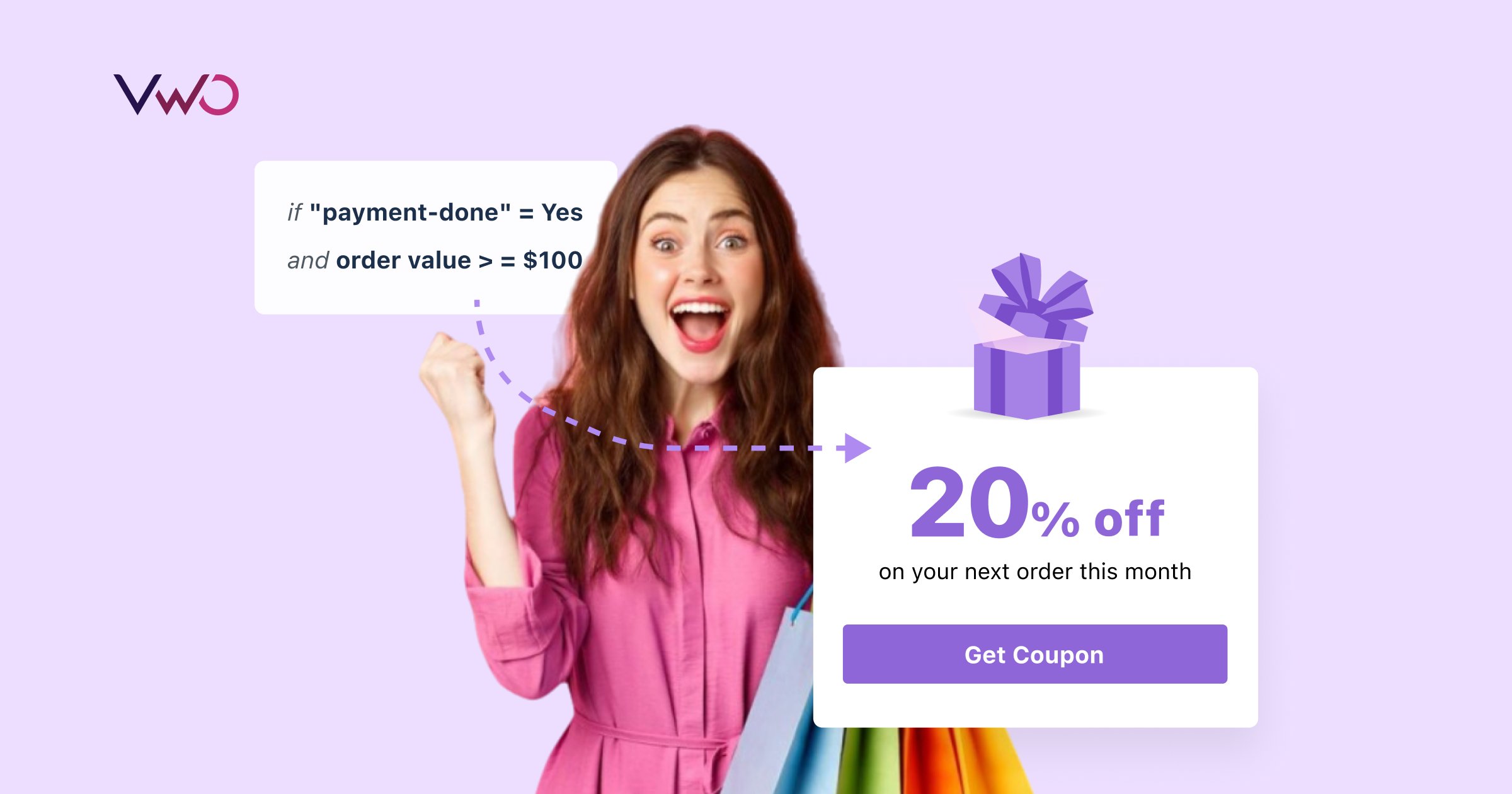
There are two types of Triggers in VWO products:
- Standard Triggers: These are predefined conditions based on which you can trigger a campaign. The following is a list of the Standard Triggers available in VWO:
- Time spent on page
- Time spent in a session
- Number of pages viewed in a session
- Exit intent
- Page scroll percentage
- Custom Triggers: By leveraging our data platform (VWO Data360), you can capture any action the visitor performs on your website as an event and use it as a trigger condition in your campaigns. What makes it more powerful is that you can also trigger a campaign based on sequential actions taken by the user. For example, you want to run a campaign that triggers when visitors add an item to their cart but remain on the page for over 60 seconds without completing the purchase. In this situation, you can display a pop-up offering a 12% discount to encourage the customer to finish their purchase. VWO enables you to trigger campaigns based on these types of sequential customer actions.
Once you have created and saved these custom triggers, you can easily select them from a list (My Triggers) whenever you want to run an experiment, personalization, deploy, or survey campaign in the future.
Benefits of using Triggers
#1 Enhanced personalization
Triggers allow you to deliver highly targeted and customized experiences to your website visitors, resulting in more personalized and relevant content and offers.
#2 Focussed optimization on your customer’s journey
By targeting campaigns to specific audiences demonstrating a certain behavior, you can save resources and budget by not showing variations to visitors who are unlikely to engage or convert.
Let’s understand where Triggers can be used
Surveys
You can use Triggers to activate your survey to your visitors at the right time and place.
For example, an online services company wants to improve its customer experience and understand pain points in its service offerings. Using Triggers, they can trigger a survey to their customers who have recently used their services, asking for feedback on their experience when they return to the website. By collecting this feedback, the online services company can identify areas for improvement in its service offerings and increase customer satisfaction.
Testing, Personalize, or Deploy Campaigns
You can use Triggers to decide when a visitor should become part of a Personalization, Deploy, or Testing campaign.
For example, an online education platform can use triggers to show different variations of its sign-up form to visitors based on where they are on the onboarding flow currently. Visitors who have spent less than 30 seconds on the website(trigger event) are shown a form with basic information. In contrast, visitors who have already signed up(trigger event) for a course are shown a different form to collect incremental data progressively. This results in higher engagement and conversion rates because visitors are more likely to fill out a form relevant to their stage in the journey.
Widgets
You can use triggers to decide when the widget will be displayed to your campaign visitor.
For example, a B2B software company could use a trigger to test whether displaying a banner with a complimentary product after a user has clicked on a specific product feature(trigger event) increases engagement. For example, they could display a banner promoting a related product once the user has signed up for a demo for a specific product.
Excited and want to know more?
If Triggers got you excited because it gives you greater control over your campaigns, we have good news. It is available across our web products VWO Testing, VWO Personalize, VWO Insights (On-Page Surveys), and VWO Deploy. To know more, look at this step-by-step guide on working with Triggers in VWO.
If you have any other questions/concerns, please feel free to contact [email protected].
The post Triggers: Have granular control of when a visitor becomes part of the campaign or is presented with a survey or widget appeared first on VWO Product Updates.
]]>The post Personalize experiences and run experiments on GA4 audiences appeared first on VWO Product Updates.
]]>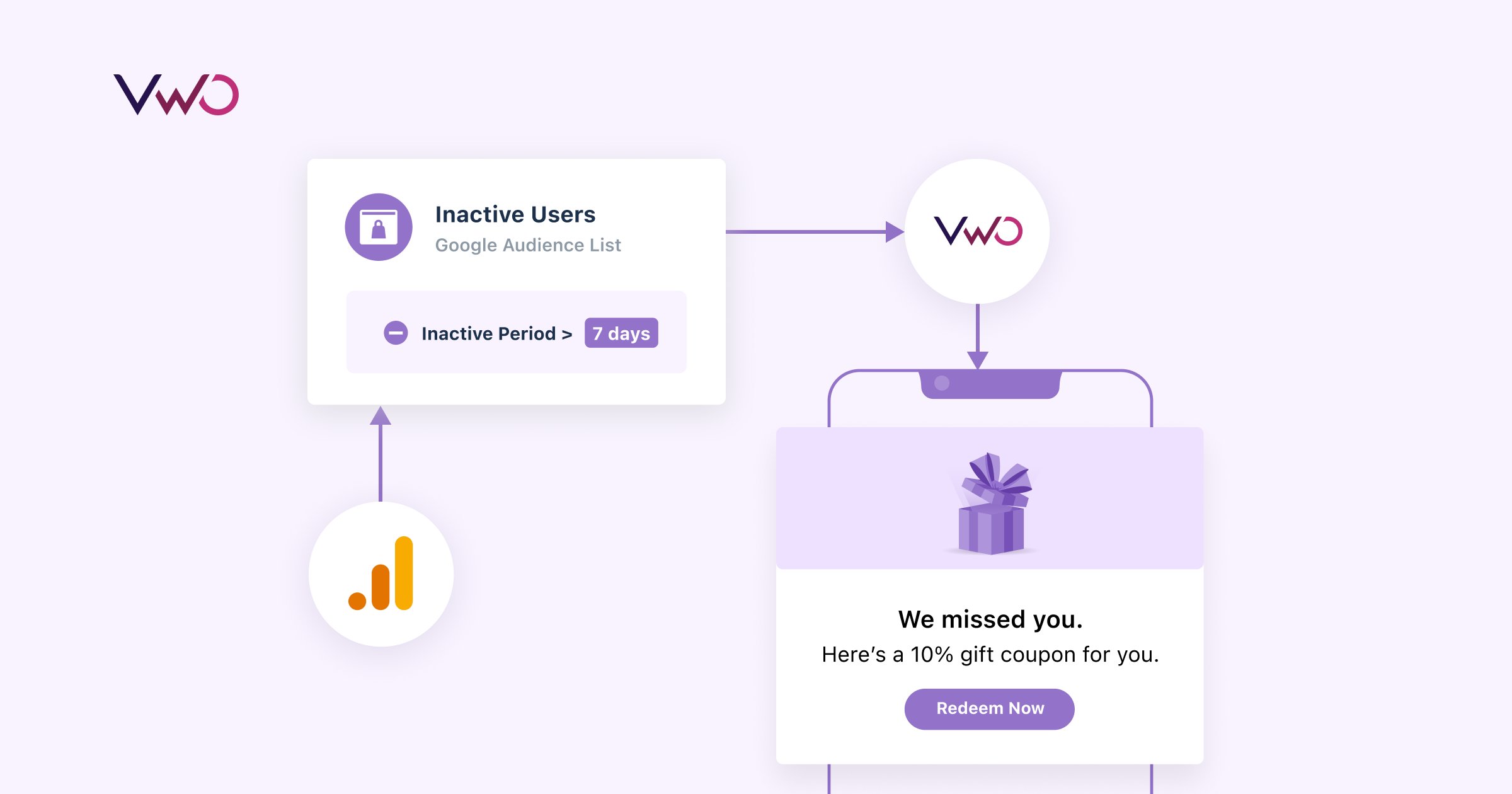
A quick overview of GA4 audiences
‘Audience’ is a grouping of users based on a range of characteristics or behavior. If you are familiar with Google Analytics, the GA4 audiences function allows you to classify your users based on dimensions, metrics, and event data. You can custom-build segments as per your individual business use cases.
The following are a few examples of audiences: Engaged Users (who have visited the website at least five times in the past month and have spent an average of five minutes on the site each visit), High Intent Users (who have visited the pricing page at least three times in the past week and have spent more than two minutes on the page each time), and Frequent Buyers (who have made at least three purchases in the past month and have a lifetime value of over $500).
Integrating GA4 with VWO
The video below shows in detail how you can connect GA4 with VWO and sync audiences to be used in campaigns.
You can sync up to five audiences from your GA account at a time into your VWO account and use them as a campaign targeting condition.
Let’s now explore some example use cases of this integration
Personalized Onboarding:
Audience: “Free Trial Users” who have completed at least 50% of the onboarding processes but have not yet converted to a subscription plan.
Using this audience from GA4 within our platform, you can run a personalized onboarding A/B test. This audience can be used to determine which onboarding experience version best converts free trial customers to premium plans.
Upgrade Testing:
Audience: “Users on Basic Plan” who have used the software for at least six months synced from GA4 to VWO.
You can run an A/B test on the pricing page using this audience on our platform. This audience can be used to determine which pricing plan variant is more effective in upgrading users from the basic plan to the premium plan.
Abandoned-Cart Recovery:
Audience: “Users who have added items to the cart but haven’t completed the purchase” sent from GA4 to VWO.
You can run an abandoned cart recovery A/B test using this audience in VWO. This audience can be used to determine if an abandoned cart recovery pop-up widget will effectively drive users to complete the purchase.
How can you use the GA4 audience list in VWO?
When creating a campaign in VWO Testing, VWO Personalize, or VWO Deploy, select ‘Enable campaign for a specific visitor group’ under ‘More Options.’ Then, go to ‘Custom segment’ and make a segment with the ‘GA4 Audience List’ condition. You can also create advanced custom targeting segments utilizing many other visitor attributes and events and save them under ‘My Segments’ for quick reuse.

Excited and want to know more?
Our new GA4 integration is available for the pro and enterprise plans of VWO Testing, VWO Personalize, and VWO Deploy. Please check out our knowledge base article to learn more and set it up in your VWO account.
For any questions or concerns, feel free to reach out to [email protected].
The post Personalize experiences and run experiments on GA4 audiences appeared first on VWO Product Updates.
]]>